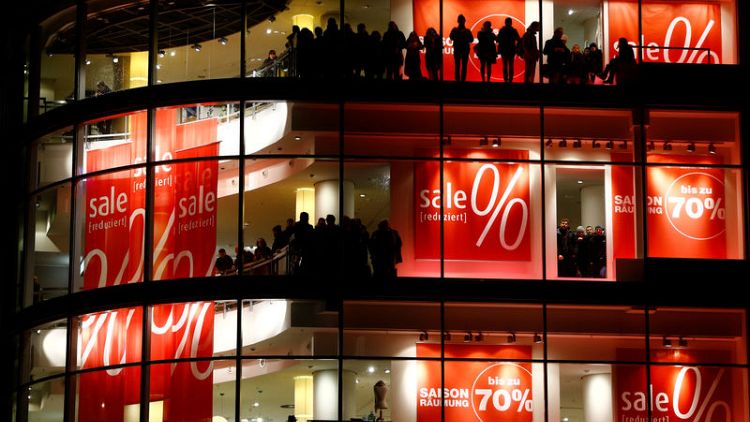By Richa Rebello and Shrutee Sarkar
BENGALURU (Reuters) - The euro zone economy has avoided a recession, according to a Reuters poll of economists who were reasonably confident of that outcome, but their growth and inflation outlook remains very modest for the coming years.
While the probability of a recession in the currency bloc over the coming two years held steady at 30% from last month, the various risks which have held back economic growth and inflation have not yet dissipated.
Still, the European Central Bank will in all likelihood do nothing when it meets to set policy on Dec. 12 and also stay on the sidelines for the next two years, the poll showed.
Sentiment around the euro zone economy has brightened somewhat over the past month. But stop-start headlines on the U.S.-China trade war and lingering uncertainty around Britain's exit from the European Union remains a threat to business activity.
With recent euro zone economic data beating low expectations, over 80% of economists polled by Reuters in the last week - 38 of 45 - said they were "reasonably confident" the euro zone economy had avoided recession.
And while a majority of those 38 respondents said "some" of that confidence was due to the European Central Bank's recent policy easing, only two said "a lot" and the remaining nearly 30% said "none".
"The ECB has had a very small contribution to the bloc avoiding a recession. It is likely due to the prospect that some of the uncertainties weighing on sentiment would diminish," said Peter Vanden Houte, chief economist at ING.
"The trade war remains volatile, but there is some expectation at least that there will be a trade deal by the turn of the year and the fact that the possibility of a hard Brexit seems to be avoided. That has had an effect on sentiment and has helped in avoiding a recession."
The Dec. 2-5 Reuters poll of over 70 economists showed economic growth in each of the quarters through to the middle of 2021 would average 0.2%-0.3%, unchanged from last month. The economy grew 0.2% last quarter, official data showed on Thursday.
But average annual growth for next year was forecast at 1.0%, which if realised would mark the slowest rate in over five years. That was also lower than the International Monetary Fund's latest outlook for 1.4%.
When asked in recent Reuters polls, economists have also become skeptical about the ECB's ability to influence inflation, which the central bank targets at close to but just below 2%.
While headline inflation jumped unexpectedly to 1% in November from 0.7% in October - a low not seen since 2016 - the poll suggested the latest pick-up in prices would be short-lived.
Indeed, inflation was expected to hover around 1.0%-1.3% in each quarter through to the middle of 2021 and the range of forecasts showed it was not expected to breach the ECB's target anytime during that period.
That is despite a blast of recent ECB policy easing, including cutting already negative interest rates and restarting its shuttered 2.6 trillion euro asset purchase programme.
It has also launched a third set of long-term loans to banks after having doled out hundreds of billions of euros worth of cheap money in the first two rounds.
ECB President Christine Lagarde will preside over her first policy meeting on Dec. 12 since taking over from Mario Draghi to slightly-improved data on the economy. Lagarde has announced a strategic review of how the central bank works.
"The news is now somewhat better than it was two or three months ago. The Council is likely to take a wait-and-see attitude, so that disputes do not boil up again. This should make the start for the new ECB President Lagarde easier," said Michael Schubert, senior economist at Commerzbank.
(Polling by Manjul Paul and Tushar Goenka; Editing by Ross Finley and Alexandra Hudson)



